The Trybuna Pratsi newspaper from the village of Ivankiv, Kyiv Region, which was under occupation in the spring of 2022, was forced to stop publishing for half a year due to financial challenges. After the de-occupation of Ivankiv, the newspaper’s editor-in-chief, Pavlo Smovzh, was able to publish several issues on his own. Later, he announced to the readers that the publication had to be discontinued. Recently, the newspaper has received donor funding and equipment and started to be published again.
The first issue was published on January 25, 2023, after the newspaper’s revival. This became possible thanks to the support of the National Union of Journalists of Ukraine (NUJU), which recommended Trybuna Pratsi for 10-month funding from the Academy of Ukrainian Press (AUP).
President of the NUJU Sergiy Tomilenko, Head of the AUP Valerii Ivanov, and Executive Director of the AUP Andrii Kovalenko visited the newsroom and presented Pavlo Smovzh with a laptop, a mobile phone, and a high-capacity power bank with a solar battery option.
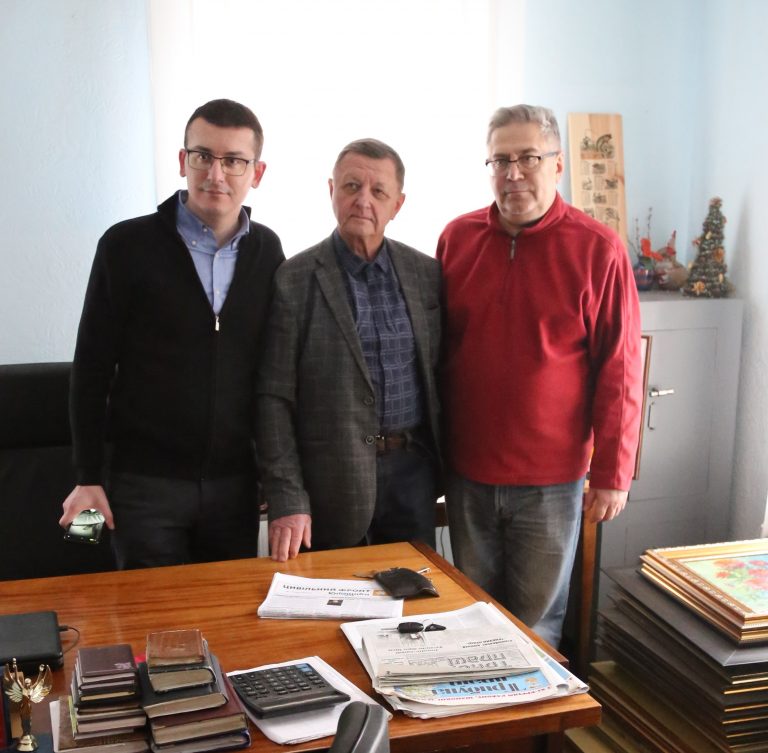
Pavlo Smovzh is currently the only person behind the newspaper’s maintenance. There is no way to keep even an accountant.
“It does not frighten me, and I consistently publish the newspaper every week. Most of the circulation is free of charge (through wardens, librarians, and social workers), while 400 more copies are sold in stores. I write about the rebuilding of the Ivankiv Community, about soldiers from the community, and about the Kyiv Region’s liberators. I provide various useful tips… Readers are delighted. When I wrote on Facebook that the newspaper was returning, I received hundreds of positive comments and thanks. During the war, this is not business; it is an information struggle and serious work,” the editor emphasized.
On the table in his office is his book about the Holodomor in Ukraine in the 1930s. The author himself says: he would never have thought he would be forced to experience such horror…
“My wife keeps chickens, so there was some grain. And I had a small grain grinder. So, I ground that grain and sifted it. And my wife baked bread. I have some horrifying photos of that bread… it looked like that from the times of the famine; however, it still was bread… We also have a fish factory near Ivankiv. There was no way to enrich the water with oxygen when there was no electricity, so the enterprise’s managers distributed fish for free. And friends and even strangers brought me some fish. Somehow, we survived,” Pavlo Smovzh recalls the March of 2022 with tears in his eyes. “In the first days, the Kadyrov fighters entered Ivankiv and did not even try to figure anything out: whoever they saw, they shot. They shot not only people but even dogs. A woman was walking down the street… She lost both legs after they shot at her using a machine gun. Just for nothing, she wasn’t guilty of anything. She was 60; what threat could she be? Houses in the villages were destroyed. In my native village of Teterivske, 111 houses were burned to the ground…”
Pavlo Smovzh did not have time to leave and would not have been able to. His wife’s mother is 91 years old; she hardly moves. There was no time to think. On February 24, after lunch, the occupiers were already in Ivankiv.
The editor has been the head of Trybuna Pratsi‘s newsroom for many years. The ancient building, which is over a century old, is located in the center of Ivankiv. Thank God, during the occupation, the building was not severely damaged. However, an explosion broke the glass and damaged the walls… But on the inside, the Russians made some mess.
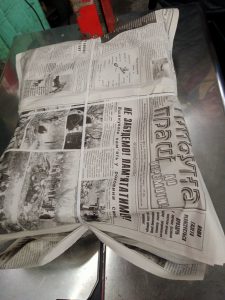
“It can be seen that they tried hard to make this mess,” says Mr. Smovzh. “They tore the bars from one window; they didn’t enter through the door. Several doors were already torn out inside; there was a real mess. In the office, everything was turned out of tables, cabinets, drawers… The stolen documents and remnants of computers and other editorial equipment were later found in the school of the neighboring village, where the occupiers were based.”
After the liberation of Ivankiv, the publication needed funds for new equipment.
“It was the time when the NUJU came to the rescue. Thanks to Sergiy Tomilenko, the President of the NUJU, the editorial staff of The Washington Post gave me a computer,” says the editor.
Pavlo Smovzh visited all the district villages to see the missile and shell funnels and recorded everything. There were also interesting finds, such as a note from a Russian pilot sent to bomb villages near Kyiv. But the plane was shot down.
“The note contained the coordinates: Prybirsk, our village nearby, Ivankiv, Hostomel… I took photos of everything the Russians did,” Pavlo Smovzh continues his story.
After the liberation, I had to maintain the newspaper on my own; almost at my expense, I had to borrow a lot of money. All that was done to inform readers and let them know the truth about Russian crimes in the war against Ukraine.
“I had a debt of UAH 71,000 at the end of the first half of the year… There was nothing to pay salary or to pay the printing house. That is why I informed the readers about the situation and warned about the discontinuation of printing,” the journalist says.
For some time, Pavlo Smovzh worked for other publications. Subsequently, at the request of the Hostomel Military Administration, he published a leaflet about the town community Visnyk Hostomel and created a regional print edition Civil Front of Kyiv Region. At the same time, he paid off the debts of Trybuna Pratsi and repaid all UAH 71,000; he compensated earlier unpaid salaries to his employees. And now, thanks to partners, he has resumed printing his native newspaper.
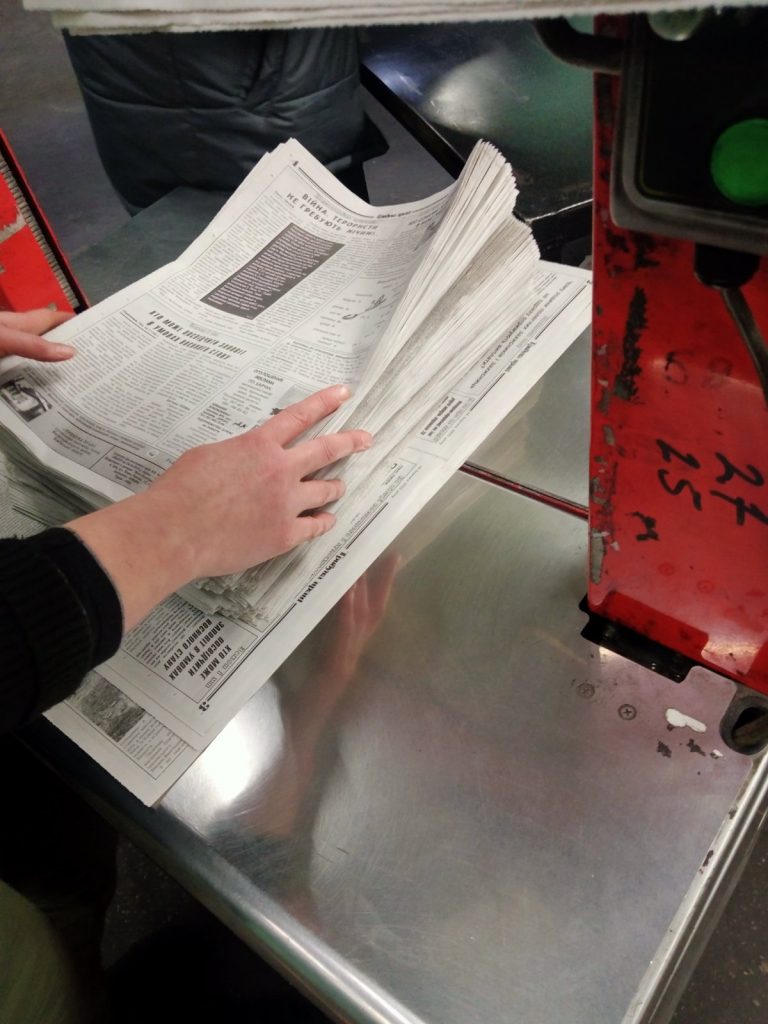
“I cannot imagine myself without journalism. That is why I would like to continue working as long as I have the strength to bring people accurate and objective information,” says Pavlo Smovzh. “I can afford it thanks to financial donors, which the NUJU helped to attract (no advertising works in our war-torn area). I sincerely thank The Washington Times for the provided computer equipment, the Academy of Ukrainian Press, and the U.S. Embassy in Ukraine for the financial support that made it possible to revive the newspaper for the second time.”
The NUJU created this media story as part of the Increasing Ukrainian Media Sustainability project financed by Swiss Solidarity and implemented with the support of the Swiss non-profit organization Fondation Hirondelle and the International Institute for Regional Media and Information (IRMI, Ukraine). Fondation Hirondelle and IRMI are implementing a project of institutional support for newsrooms of Ukrainian media in the east, north, and south of our country, with an emphasis on the local press. They also launched a 10-month support program for 18 media.
Economic reference
Trybuna Pratsi newspaper newsroom
Region of distribution: Ivankiv Community, Kyiv Region
Editor-in-chief: Pavlo Smovzh

 THE NATIONAL UNION OF
JOURNALISTS OF UKRAINE
THE NATIONAL UNION OF
JOURNALISTS OF UKRAINE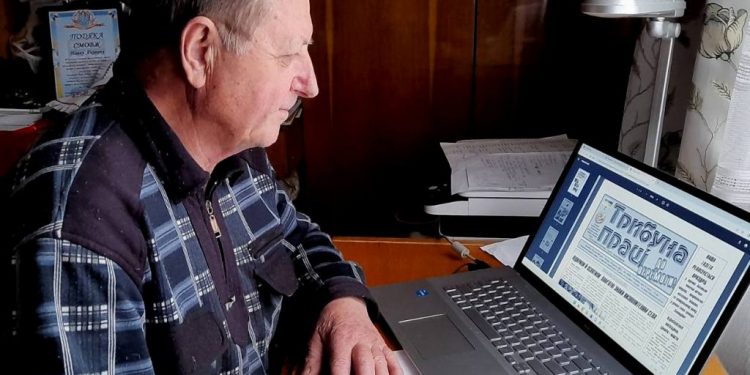
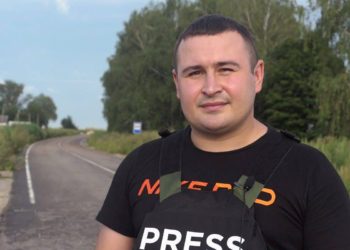
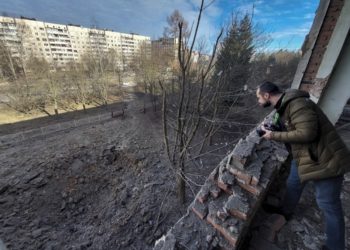
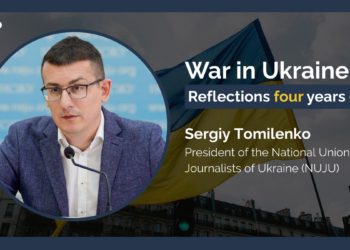













Discussion about this post